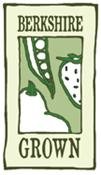
In January 2004 I began interning with
Hawthorne Valley Farm's Visiting Student Program. During my internship we took part in many sides of the farm: caring for the animals, planting in the greenhouse, baking in the bakery, and working in the dairy. We also had the opportunity to work in Seth Travins' Kraut Cellar, where we shredded and hand packed fresh vegetables into jars. Also called "Sauerkraut Seth," he began producing lacto-fermented vegetables at Hawthorne Valley in 1998.
Seth's Kraut Cellar currently produces the following lacto-fermented vegetables: plain sauerkraut, caraway sauerkraut, curry sauerkraut, jalapeno sauerkraut, ruby sauerkraut, ginger carrots, kim chee, dilly beans, and pickles. Check out the
Hawthorne Valley Farm Store or sellers of local food products near you to try it out these treats yourself. Learn more about lacto-fermented vegetables
here.
I had the opportunity to get in touch with Seth again, to learn more about the Berkshires krauter.
LF: How did you become interested in sauerkraut and lacto-fermentation?
ST: I became interested in sauerkraut and lacto-fermentation in the fall and winter of 1998 when I was an apprentice at Hawthorne Valley Farm. There were a few pounds of leftover storage cabbage. At the time I had read about different food preservation techniques and they all seemed very fuel intensive. At about the same time I tried raw sauerkraut for the first time and I had a "Eureka" moment. I had to try to make it myself. Fermented vegetables seemed so alive and tasted so good compared to canned or frozen (or even fresh Californian) vegetables. I had grown up in New York eating raw sour pickles without it even registering; all of a sudden it clicked, and I had a goal in mind.
LF: Who do you consider your mentors and biggest influences?
ST: The first time I tried raw sauerkraut was when I met Peter Young. He made sauerkraut at the Hill Farm in Marshfield, Vermont back in the 1990s. In the spring of 1999 I visited his farm, and I was on my way. Louise Frazier is a longtime vegetarian cook, sauerkraut maker, and supporter of Biodynamic Farming, and I was lucky to ask her many many questions when I got started.
LF: What does a typical Sauerkraut Seth day look like? How does it begin, how does it end, and what happens in between?
ST: A typical day for me starts with checking into the Kraut Cellar, and look at that orders that need to go out. Orders often drive how the workday goes, particularly in the late winter and early spring. We try to package a whole barrel of product at a time, and keep a little ahead of our orders. As a USDA certified organic producer, we have quite a bit of record keeping to do. This gives us a very good tracking system, which in the long run is a very good thing.
The most exciting time of the workday is taste testing products which have been fermenting and aging for as little as two weeks to as much as a year. Fresh sauerkraut made in October and sampled in the dead of winter tastes like nothing else. It really hits the spot.
A typical production day (3-4 days a week) in the fall involves prepping hundreds to thousands of pounds of vegetables (with 1 or 2 helpers), shredding these vegetables, and packing them into barrrels with salt and spices. Such production days can take 8 hours. We have made as many as seven 300 pound barrels in an 8 hour shift. That's a lotta cabbage! In the late winter and early spring months we pack sauerkraut 2-3 days a week, depending on orders, so things are not as hectic as in the fall.
The interest in lacto-fermented vegetables has increased over the last ten years. The Weston A Price Foundation seems to have had a lot to do with this resurgence of fermented food in general, as well as raw milk, and grass raised livestock. With this interest in lacto-fermented vegtables I seem to average quite a few phone calls a week. I have advised and consulted other kraut upstarts as well.
A big thanks to Seth for taking the time to conduct this interview.



No comments:
Post a Comment